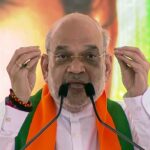More than one in 10 single people under 50 say they are having less sex because the US supreme court overturned Roe v Wade, according to a new study.
On Wednesday, Match Group, which operates Tinder, Hinge and a slew of other matchmaking platforms, released the latest findings from its long-running Singles in America survey, a snapshot of more than 5,000 single Americans’ thoughts and experiences around dating and sex. For the second year in a row, Match has found that the demolition of the national right to abortion is affecting how Americans say they date and have sex with one another.
Since Roe fell, more than 20 states have significantly restricted abortion access. Thirteen per cent of singles under 50 said that they are now more afraid of getting pregnant or getting someone else pregnant, including 21% of gen Z singles between the ages of 18 and 26. Twelve per cent of singles under 50 also said that Roe’s demise has made them more hesitant to date, while 11% said they have casual sex less frequently and the same number reported having less sex overall. Seven per cent said that they are more likely to have sex in ways that lower the risk of pregnancy, such as non-penetrative sex.
“It has become a litmus test for people that it’s too much trouble to date,” one survey respondent said of Roe. Another added: “I’m bisexual, so it makes me think I should strictly date women.”
One in 10 say that, when they do have sex, they are more nervous or anxious.
“Not only is it impacting behavior, it’s also impacting the meaning and the quality of the experience that people are having. It’s really remarkable that legislation is making people feel more nervous or worried or less comfortable with their sexual lives,” said Justin Garcia, the executive director of the Kinsey Institute and a scientific adviser to Match Group.
This kind of anxiety, Garcia said, threatens people’s ability to form partnerships: “You’re not gonna connect that well if you’re feeling anxious the whole time.”
These statistics provide a rare peek into the link between abortion access and people’s sex lives, as there is relatively little research into the connection. Although the Singles in America survey is not longitudinal – new people are surveyed with every iteration – worries about the end of federal abortion protections seem to be on the rise: last year, 78% of survey singles said that Roe’s fall had affected their sex and dating lives. This year, the number jumped to 87%.
Republicans are often vocal about their support for particular kinds of sex – specifically, the heterosexual, married and procreative kind – and have pushed policies to discourage sex among single people, including slashing access to abortion, particular types of birth control, and comprehensive sex ed in schools. The Match survey suggests their efforts might be succeeding.
At the National Pro-Life Summit, held over the weekend, Kevin Roberts, the head of the leading conservative thinktank the Heritage Foundation, urged attendees to build “a culture of life” through “the heroic spiritual adventure of falling in love, getting married and, yes, having lots of kids”. The room erupted in applause.
But Roe’s demise has contributed to more use of birth control, the Singles in America survey found. Thirteen per cent of singles under 50 said that they now use condoms more often. Meanwhile, 7% of women said that they got an IUD and 5% of men said they got a vasectomy in response to the ruling.
The survey arrives at a time when abortion is increasingly on the ballot. The vice-president, Kamala Harris, this week kicked off a tour to spotlight how a Republican administration may further devastate abortion rights, as Democrats believe that outrage over Roe may win them votes in the 2024 elections.
after newsletter promotion
Seventy per cent of singles said that a candidate’s views on abortion will have some impact on their vote. Nearly a quarter said that abortion legislation will completely determine their vote, including 30% of Democrats and 20% of Republicans and libertarians. Women were more likely to say that abortion would determine their vote: 26% of women said so, compared to 18% of men.
“I’m furious and will only vote for Democrats for any elected office,” one respondent said.
Ultimately, many singles may not vote at all. Fourteen per cent said they do not plan to vote in the upcoming election, including 20% of gen Z singles, according to the survey.
There are more than 100 million single people in the United States. They’re an enormous and overlooked demographic, Garcia said.
“Relationships status can impact people’s views and their commitments to certain issues,” Garcia said. “It’s a group that someone can scoop up. Those aren’t negligible numbers in a tight election. That’s a very large group of singles that don’t feel engaged. What an opportunity for politicians to think about relationship status and singlehood and to engage those people.”
Follow us on Google news ,Twitter , and Join Whatsapp Group of thelocalreport.in
















